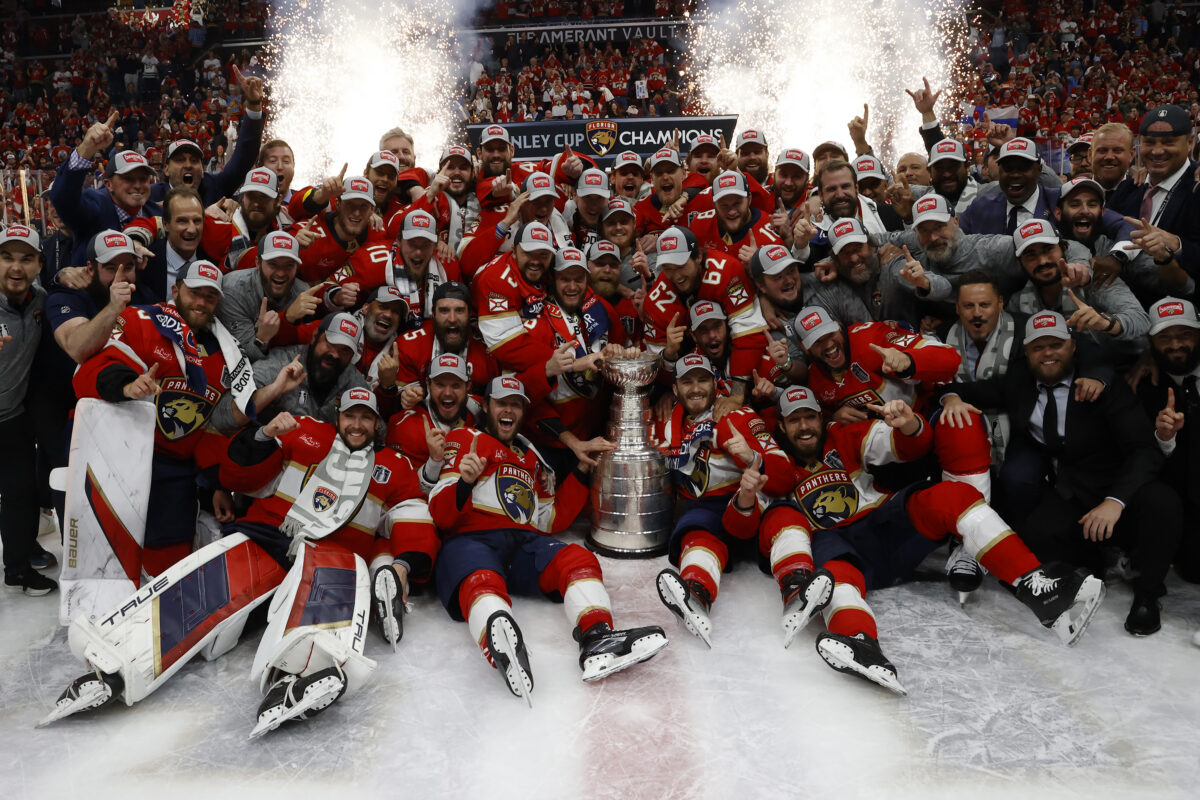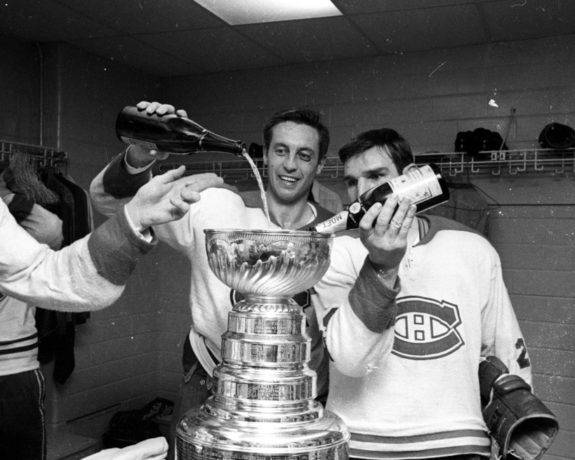The Stanley Cup is the oldest existing trophy to be awarded to a professional sports franchise in North America. The trophy is awarded annually to the winner of the National Hockey League (NHL) playoffs. The trophy was originally commissioned by Lord Stanley of Preston, the Governor General of Canada, in 1892 as the Dominion Hockey Challenge Cup. Lord Stanley donated it to reward Canada’s top-ranking amateur hockey club.
The first Cup was awarded in 1893 to Montreal Hockey Club, and winners from 1893 to 1914 were determined by challenge games and league play. Professional teams first became eligible to challenge for the Stanley Cup in 1906. In 1915, the National Hockey Association (NHA) and the Pacific Coast Hockey Association (PCHA), the two main professional ice hockey organizations, reached a gentlemen’s agreement in which their respective champions would face each other annually for the Stanley Cup. It was established as the de facto championship trophy of the NHL in 1926 and then the de jure NHL championship prize in 1947.
2024-25 Defending Champions – Florida Panthers
Deeper Dive
- Little Known Facts About the Stanley Cup
- The Day the Stanley Cup Was Stolen
- Franchises That Have Never Won the Stanley Cup
- Longest Stanley Cup Droughts

Stanley Cup Winners (since 1927)

Stanley Cup History (1893-1926)
Challenge Cup Era (1893-1914)
The origins of the Challenge era come from the method of play of the Amateur Hockey Association of Canada prior to 1893. From 1887 to 1893, the league did not play a round-robin format, but rather challenges between teams of the association that year, with the winner of the series being the ‘interim’ champion, with the final challenge winner becoming the league champion for the year. The Stanley Cup kept the tradition going, but added league championships as another way that a team could win the trophy. If a team in the same league as the current champion won the league championship, it would then inherit the Cup, without a challenge. The only time this rule was not followed was in 1904, when the Ottawa Senators club withdrew from its league, the CAHL. The trustees ruled that the Cup stayed with Ottawa, instead of the CAHL league champion.
In 1908, the Allan Cup was introduced as the trophy for Canada’s amateur teams, and the Stanley Cup because the symbol of professional hockey supremacy.
| Date | Winner | Runner-Up | Format | Score |
| March 17, 1893 | Montreal Hockey Club | — | AHAC Champion | — |
| March 22, 1894 | Montreal Hockey Club | Ottawa HC | Challenge Game | 3-1 |
| March 9, 1895 | Montreal Hockey Club | Queen’s University | Challenge Game | 5-1 |
| March 9, 1895 | Montreal Victorias | — | AHAC Champion | — |
| February 14, 1896 | Winnipeg Victorias | Montreal Victorias | Challenge Game | 2-0 |
| February 29, 1896 | Winnipeg Victorias | — | MHA Champion | — |
| December 30, 1896 | Montreal Victorias | Winnipeg Victorias | Challenge Game | 6-5 |
| March 6, 1897 | Montreal Victorias | — | AHAC Champion | — |
| December 27, 1897 | Montreal Victorias | Ottawa Capitals | Challenge Game | 15-2 |
| March 5, 1898 | Montreal Victorias | — | AHAC Champion | — |
| February 15-18, 1899 | Montreal Victorias | Winnipeg Victorias | Two-Game, Total Goals | 5-3 |
| March 4, 1899 | Montreal Shamrocks | — | CAHL Champion | — |
| March 14, 1899 | Montreal Shamrocks | Queen’s University | Challenge Game | 6-2 |
| February 12-15, 1900 | Montreal Shamrocks | Winnipeg Victorias | Best-of-Three | 2-1 |
| March 7, 1900 | Montreal Shamrocks | Halifax Crescents | Best-of-Three | 2-0 |
| March 10, 1900 | Montreal Shamrocks | — | CAHL Champion | — |
| January 29-31, 1901 | Winnipeg Victorias | Montreal Shamrocks | Best-of-Three | 2-0 |
| February 19, 1901 | Winnipeg Victorias | Winnipeg HC | Challenge Game | 4-3 |
| January 21-23, 1902 | Winnipeg Victorias | Toronto Wellingtons | Best-of-Three | 2-0 |
| March 1902 | Winnipeg Victorias | — | MHA Champions | — |
| March 13-17, 1902 | Montreal HC | Winnipeg Victorias | Best-of-Three | 2-1 |
| January 29-February 4, 1903 | Montreal HC | Winnipeg Victorias | Best-of-Three | 2-1 |
| March 7-10, 1903 | Ottawa HC | Montreal Victorias | Two-Game, Total Goals | 9-1 |
| March 12-14, 1903 | Ottawa HC | Rat Portage Thistles | Two-Game, Total Goals | 10-4 |
| December 30, 1903, to January 4, 1904 | Ottawa HC | Winnipeg Rowing Club | Best-of-Three | 2-1 |
| February 23-25, 1904 | Ottawa HC | Toronto Marlboros | Best-of-Three | 2-0 |
| March 2, 1904 | Ottawa HC | Montreal Wanderers | Two-Game, Total Goals | See Note 1 |
| March 9-11, 1904 | Ottawa HC | Brandon Wheat Cities | Best-of-Three | 2-0 |
| January 13-16, 1905 | Ottawa HC | Dawson City Nuggets | Best-of-Three | 2-0 |
| March 3, 1905 | Ottawa HC | — | FAHL Champions | — |
| March 7-11, 1905 | Ottawa HC | Rat Portage Thistles | Best-of-Three | 2-1 |
| February 27-28, 1906 | Ottawa HC | Queen’s University | Best-of-Three | 2-0 |
| March 6-8, 1906 | Ottawa HC | Smiths Falls HC | Best-of-Three | 2-0 |
| March 14-17, 1906 | Montreal Wanderers | Ottawa HC | Two-Game, Total Goals | 12-10 |
| December 27-29, 1906 | Montreal Wanderers | New Glasgow Cubs | Two-Game, Total Goals | 17-5 |
| January 21-23, 1907 | Kenora Thistles | Montreal Wanderers | Two-Game, Total Goals | 12-8 |
| March 16-18, 1907 | Kenora Thistles | Brandon Wheat Cities | Best-of-Three | 2-0 |
| March 23-25, 1907 | Montreal Wanderers | Kenora Thistles | Two-Game, Total Goals | 12-8 |
| January 9-13, 1908 | Montreal Wanderers | Ottawa Victorias | Two-Game, Total Goals | 22-4 |
| March 7, 1908 | Montreal Wanderers | — | ECAHA Champions | — |
| March 10-12, 1908 | Montreal Wanderers | Winnipeg Maple Leafs | Two-Game, Total Goals | 20-8 |
| March 14, 1908 | Montreal Wanderers | Toronto | Challenge Game | 6-4 |
| December 28-30, 1908 | Montreal Wanderers | Edmonton Hockey Club | Two-Game, Total Goals | 13-10 |
| March 6, 1909 | Ottawa HC | — | ECHA Champions | — |
| January 5-7, 1910 | Ottawa HC | Galt HC | Two-Game, Total Goals | 15-4 |
| January 18-20, 1910 | Ottawa HC | Edmonton Hockey Club | Two-Game, Total Goals | 21-11 |
| March 9, 1910 | Montreal Wanderers | — | NHA Champion | — |
| March 12, 1910 | Montreal Wanderers | Berlin Dutchmen | Challenge Game | 7-3 |
| March 10, 1911 | Ottawa HC | — | NHA Champions | — |
| March 13, 1911 | Ottawa HC | Galt HC | Challenge Game | 7-4 |
| March 16, 1911 | Ottawa HC | Port Arthur Bearcats | Challenge Game | 13-4 |
| March 5, 1912 | Quebec Bulldogs | — | NHA Champions | — |
| March 11-13, 1912 | Quebec Bulldogs | Moncton Victorias | Best-of-Three | 2-0 |
| March 5, 1913 | Quebec Bulldogs | — | NHA Champions | — |
| March 8-10, 1913 | Quebec Bulldogs | Sydney Millionaires | Two-Game, Total Goals | 20-5 |
| March 7-11, 1914 | Toronto Hockey Club | Montreal Canadiens | Two-Game, Total Goals | 6-2 |
| March 14-19, 1914 | Toronto Hockey Club | Victoria Aristocrats | Best-of-Five | 3-0 |
NOTES: 1. The Montreal Wanderers were disqualified as the result of a dispute. After game one ended tied at the end of regulation, 5–5, the Wanderers refused to play overtime with the current referee, and then subsequently refused to play the next game of the series in Ottawa.
NHA/NHL vs. PCHA/WCHL/WHL winners (1915-1926)
Around the turn of the century, professional teams started to dominate the competition. In 1913, the National Hockey Association (NHA) and Pacific Coast Hockey Association (PCHA) agreed to have their respective champions face each other in an annual series.
After the Toronto Hockey Club/Victoria Aristocrats series in 1914, the NHA, PCHA and Maritime league agreed to a series of matches to be played for the Stanley Cup. The Maritime folded after the 1915 season. The Stanley Cup championship finals alternated between the East and the West each year, with games played alternately under NHA or PCHA rules.
After the New Westminster Royal moved to Portland in the summer of 1914 becoming the Portland Rosebuds, an American-based team, the trustees issued a statement that the Cup was no longer for the best team in Canada, but now for the best team in the world. In March 1916, the Rosebuds became the first American team to play in the Stanley Cup championship final. In 1917, the Seattle Metropolitans became the first American team to win the Cup. After that season, the NHA suspended operations and the National Hockey League (NHL) took its place.
The format for the Stanley Cup championship changed in 1922, with the creation of the Western Canada Hockey League (WCHL). Now three leagues competed for the Cup and this necessitated a semi-final series between two league champions, with the third having a bye directly to the final. In 1924, the PCHA folded and only the Vancouver and Victoria teams entered the WCHL. With the loss of the PCHA, the championship reverted to a single series.
| Year | Winner | Runner-Up | Games |
| 1915 | Vancouver Millionaires | Ottawa Senators | 3-0 |
| 1916 | Montreal Canadiens | Portland Rosebuds | 3-2 |
| 1917 | Seattle Metropolitans | Montreal Canadiens | 3-1 |
| 1918 | Toronto Arenas | Vancouver Millionaires | 3-2 |
| 1919 | Series Cancelled | Spanish Flu Epidemic | — |
| 1920 | Ottawa Senators | Seattle Metropolitans | 3-2 |
| 1921 | Ottawa Senators | Vancouver Millionaires | 3-2 |
| 1922 | Toronto St. Particks | Vancouver Millionaires | 3-2 |
| 1923 | Ottawa Senators | Edmonton Eskimos | 2-0 |
| 1924 | Montreal Canadiens | Calgary Tigers | 2-0 |
| 1925 | Victoria Cougars | Montreal Canadiens | 3-1 |
| 1926 | Montreal Maroons | Victoria Cougars | 3-1 |